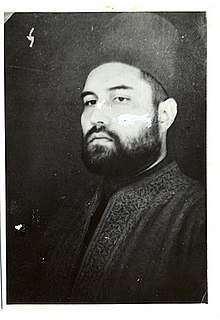Bahadur Yar Jung
| Bahadur Yar Jung | |
|---|---|
 | |
| Born |
Muhammad Bahadur Khan 3 February 1905 Hyderabad, Hyderabad Deccan |
| Died |
25 June 1944 (aged 39) Hyderabad, Hyderabad Deccan |
| Cause of death | Suspected poisoned; his 'hukka' (water pipe) was poisoned when he went to meet the opposition party. |
| Resting place | Musheerabad, Hyderabad, India |
| Nationality | Hyderabad, British India |
| Other names | Quaid-e-Millat, Bahadur Yar Jung |
| Alma mater | Madarsay Darul-Uloom, now called City College Hyderabad |
| Known for |
Prominent figure of Pakistan Movement, who propounded the philosophy of Sharia Law and Muslim State. Associated with: Majlis-e-Ittehadul Muslimeen he was first President of MIM Muslim League Khaksar Tehrik |
| Political party |
Majlis-e-Ittehadul Muslimeen Muslim League Khaksar Tehrik |
| Spouse(s) | Tal-a-mand Khatoon (طالع مند خاتون) |
| Parent(s) |
Khatoon (mother) Nawab Naseeb Yar Jung (father) |
| Website | bahaduryarjung.org |
Nawab Bahadur Yar Jung (or Bahadur Yar Jang) (3 February 1905, Hyderabad – 25 June 1944) (Urdu: بہادر یار جنگ) was a foremost Muslim leader in the princely state of Hyderabad in British India. He founded the branches of Mahdavia and Mahdi Pathan in Hyderabad and was known as a powerful religious preacher. In 1938, he was elected the President of Majlis-e-Ittehadul Muslimeen, a position in which he served till his death.[1][2][3]
Career

Bahadur Yar Jung wanted his own princely home state, Hyderabad, to be separate from the rest of India as a Islamic/Muslim state with Sharia Law in force. He led an organisation called Majlis-e-Ittehadul Muslimeen, for the propagation of Islam. A friend and aid to Mohammed Iqbal and Muhammad Ali Jinnah, he was one of the most admired leaders of the Pakistan Movement. In 1926, Bahadur Yar Jung was elected president of the Society of Mahdavis. In 1927, he led an organisation called Majlis-e-Ittehadul Muslimeen, of which he was the founder member. In 1930, he was elected secretary of the Union of Jagirdars which had been established in 1892 but was moribund. A great Muslim zealot, he advocated peaceful but separate and independent co-existence among people of different religions after the independence of British India. So he vigorously supported All India Muslim League and the Pakistan Movement. He was closely associated with both Allama Iqbal and Muhammad Ali Jinnah. He was a great author and a devoted Muslim.[2][4][3]
Oratory

Matched by very few, his oratory skills served as a catalyst to the independence struggle of British India.[4]
On 26 December 1943, he delivered an important speech in the All India Muslim League Conference. In the first half of his speech he laid stress on the struggle for Pakistan. In the second half he talked about the creation of Pakistan. At the end he said,
- "Muslims! Solutions found in zest copying others sometimes are temporary and therefore transitory. Today we don’t need those who want to shine as a flower on the tree of our nation and taste sweet on the lips as a fruit. We need those who become fertilisers and get assimilated into the earth, making its roots stronger. The ones who become water and soil to produce the colourful flowers; annihilate themselves to make the fruits sweet. We don’t need decoration for the halls to enchant the viewer, we want those stones of the foundation that, buried forever, accept the responsibility of the stability of the structure above.
"[5]
Family
He was the oldest son of Nawab Naseeb Yar Jung. Nawab Mohammed Mandur Khan and Justice Nawab Mohammed Daulat Khan were his brothers. Moazzam Khan, Member Legislative Assembly of Telangana State, is his grand nephew.
Named to honor him
Bahadurabad, a neighbourhood of Karachi, Sindh, Pakistan, is named after Bahadur Yar Jung.[6] City of Karachi, Pakistan also has Bahadur Yar Jung Library , Bahadur Yar Jung Academy and Bahadur Yar Jung Govt. School Jail road Karachi named after him.[3]
Commemorative postage stamp
In 1990, Pakistan Post issued a postage stamp depicting him in its 'Pioneers of Freedom' series designed by Saeed Akhtar.[7][8]
See also
References
- ↑ Benichou, Autocracy to Integration 2000, Chapter 4.
- 1 2 Preserving the legacy of Nawab Bahadur Yar Jung (1905-1944), TwoCircles.net website, Published 12 March 2012, Retrieved 28 August 2017
- 1 2 3 Tribute paid to Bahadur Yar Jung, Dawn (newspaper), Published 28 June 2011, Retrieved 28 August 2017
- 1 2 Glowing tributes paid to Nawab Bahadur Yar Jung, Published 28 June 2014, Retrieved 28 August 2017
- ↑ BAHADAR YAR JANG Archived 7 April 2006 at the Wayback Machine. at www.brain.net.pk
- ↑ Bahadur Yar Jung Library in Bahadurabad, Karachi, Pakistan, Dawn (newspaper), Published 21 June 2011, Retrieved 28 August 2017
- ↑ Profile with commemorative postage stamp image on findpk.com website, Retrieved 28 August 2017
- ↑ Bahadur Yar Jung commemorative postage stamp issued in 1990 by Pakistan Post Office, Retrieved 28 August 2017
9. Sawaneh Bahadur Yar Jung (سوانح بہادر یار جنگ) by Nazeeeruddin Ahmed, 2007
Bibliography
- Benichou, Lucien D. (2000), From Autocracy to Integration: Political Developments in Hyderabad State, 1938–1948, Orient Blackswan, ISBN 978-81-250-1847-6
